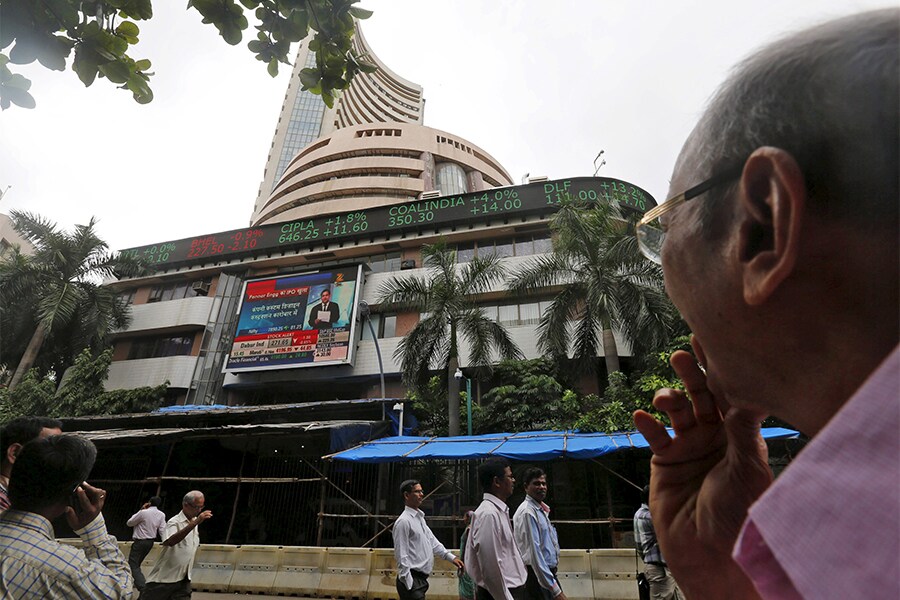
Indian equities slide on Trump victory
Indian currency demonetisation move to hit real estate, microfinance companies; gold gains unlikely to sustain
 Shailesh Andrade / Reuters
Shailesh Andrade / Reuters
India’s stock markets got a double whammy. It tumbled in morning trade Wednesday, as investors chose to unwind built up positions after the government in a surprise move Tuesday night announced the demonetization of the Rs 500 and Rs 1,000 rupee notes, to crack down on black money, fake currency and corruption. Also, a collapse across the Asian markets, after the surprise victory by Republican candidate Donald Trump over Democratic Hillary Clinton sent the stocks down. This development is likely to keep global equity markets volatile in the near term and impact investment decisions towards emerging markets, including India.
Across Asia, the equity markets fell sharply. The Hang Seng index fell 2.28 percent to 22,386.26; the KOSPI fell 2.25 percent to 1,958.38 and Shanghai Composite index slid 0.61 percent to 3,128.77 points. Trump was announced as the 45th US president after beating rival Clinton by grabbing 280 votes, six more than the requisite 270 required for victory.
In India, the uncertainty over the flow and usage of cash in the economy, until new currency notes flow into the system, have raised concerns over economic growth which kept stock prices down.. India’s benchmark 30-share Sensitive index slumped as much as 6.12 percent or 1,688.69 points to a day’s low of 25,902.45 in early trade, before edging back up to 27,190.03 points, recovering by 4.9 percent.
As seen with most global equity markets slides, global gold prices moved up on Wednesday morning to $1,335 per troy ounce, from $1,298 levels a day earlier.
“Stock markets -- and especially directly affected sectors like financials, real estate, cement and consumer-goods sectors -- may initially react negatively to the government’s announcement (given the near term stress and slowdown in velocity of business that is likely),” Dipen Sheth, head of research and Romit Fernandes of HDFC Securities, said in a note to clients, commenting on the government’s currency demonetization move.
“Expect an abrupt (but hopefully temporary) jolt to the velocity of money flowing through the economy,” the HDFC Securities analysts said, adding that the real estate sector would be hard hit, as developers could run into a tight liquidity squeeze over the short term and lad prices could also correct.
Ritika Mankar Mukherjee, as enior analyst at Ambit Capital said that “discounting usage of either of (Rs 500 and Rs 1,000) notes can increase the physical costs and risk of holding black money significantly.” A latest Ambit note estimates that 48 percent and 39 of the total value of currency in India is in the form of Rs 500 and Rs 1000 notes respectively.
Most analysts agreed that the latest government moves would help bring down corruption-led friction in the economy, increase tax collection and broaden tax compliance sustainably. It will result in the proportion of ‘cash less’ transactions going up, which will benefit banks overall. The move to bring India to an economy which uses less cash is what the Reserve Bank of India has been working on for the past five years.
Jariwala however argued that in the near term for a few weeks, microfinance companies would find it difficult to collect and disburse cash. “Therefore in the worst case they may have to postpone collection of one or two EMIs and disbursements may not happen in the next 10 days due to non-availability of currency notes.”
Prime Minister Narendra Modi’s latest move is seen as a bonanza for several e-commerce companies, which are focussed on mobile payments.
“I can’t believe a master stroke which has been taken to curb [usage of] black money. This is the time to say no to cash and no to corruption. It will be few days of pain and then massive gains for the economy,” Vijay Shekhar Sharma, founder of e-commerce mobile platform Paytm, said on the sidelines of the Forbes India Leadership Awards 2016 on Tuesday night, when the government demonitisation of notes was announced.
“This is the age of digital and financial services, so more [players are] welcome,” a beaming Sharma said, when asked about increasing competition in the mobile payments space.
Porush Singh, division president (South Asia) with Mastercard said the government’s latest move to ban these high-value currency notes “will enable further growth in the Indian economy by encouraging cashless transactions and reducing crime rate.”
Analysts said that gold prices were likely to remain firm in the near term but the trend may not sustain for long. Anand James, chief market strategist at Geojit BNP Paribas Financial Services said: “Gold is responding in a manner which we have expected it to behave. Some amount of panic and hedging against that has led to gold prices moving up. But I am not sure if this upswing will sustain. There could be pressure at the $ 1385 levels.”





